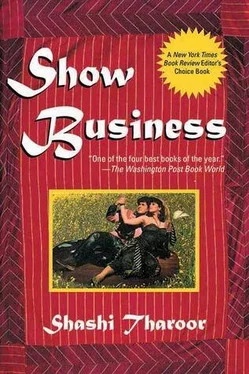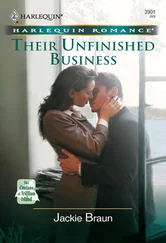“No!” screams Abha, clutching her infants to her considerable bosom. “This cannot be!”
“It is true, Abhaji,” Raju says sadly, tears in his rheumy eyes.
“There is only one thing to do,” Amma opines. “You must flee with the babies, somewhere where they will be safe.”
“But where?” asks Abha in desperation. “Where can I go?” She looks directly at the camera. “If only my husband, the boys’ father, had not been jailed for a crime he did not commit,” she declares for the audience’s benefit, “he would never have let my evil brother do this to me.”
“What is the use of thinking about him now?” Amma asks impatiently. “You must go soon.”
“I have a cousin who works in a factory in Bombay,” Raju says. “We can go there. He will get me a job in the factory, and the boys will be safe.”
“You have no choice,” Amma confirms. “Quick, let me get you ready.”
Soon they are prepared to leave. Abha removes from around her neck a black string necklace with two talismans hanging from it.
“Your father gave this to me,” she whispers to the babies. “Now you must have it, for luck.” She snaps the string in two, then ties each half to a baby’s wrist. A close-up reveals a single talisman dangling from each baby’s pudgy arm. The two are identical.
Exterior: twilight. Raju and Abha are seen running down a path toward a river. Each carries a basket. Thick foliage abounds on both sides.
“I shall take one basket across,” Raju says, “and then come back for you.”
He wades across the river, baby and basket aloft. Abha stands at the water’s edge, looking helpless, her own basket heavy in her hand. The music on the sound track is dramatic, suspenseful.
“There she is!” a voice cries out as the violins explode in a heart-stopping crescendo. Kalia it is, with another bandit by his side, both on horseback. “The babies must be in the basket. Come on, let’s get her!”
“No!” Abha screams as the horses canter down the path. Raju, three-quarters of the way across the river, looks back in uncertainty. “Go on!” she instructs him. “They haven’t seen you yet. Go on, quickly! I’ll manage on my own somehow.”
Raju hesitates, hears the horses’ hooves, and wades on. He soon disappears into the foliage on the other side.
Abha steps into the water, trying to hold the basket high. The current swirls relentlessly around her. “Stop!” cries Kalia, charging onward. “Stop!”
Abha takes another step forward, stumbles. A shot rings out, then another. She screams. A red stain appears on her blouse. She falls, and the basket slips out of her grasp. With a last despairing wail, she reaches out for it, but the basket is caught by the current and floats rapidly downriver.
“No!” she screams again (her dialogue was easy to learn). The basket disappears, and Abha sinks under the water as Kalia and his accomplice draw their horses up to the rivers edge.
“Too bad,” says Kalia as Raju, panting, gapes at them through a gap in the jungle shrubbery that he has hidden in. “All drowned, for certain. Well, that’s what the Thakur wanted, wasn’t it?” His partner nods: he has a nonspeaking part.
“Well, let’s get back to the boss and give him the sad news,” Kalia laughs. “He won’t be too upset: she was only an adoptive sister anyway.” The two wheel their horses around and canter back up the path.
Raju is seen running, the basket in his hand. The camera cuts to the other basket floating safely on the current. Inside the baby cries, waving a pudgy fist with a black string talisman dangling from his wrist. The waters swirl, Raju runs, the basket floats, the baby cries. And the opening credits fill the screen.
As the director’s name fades from the screen, the camera pans to a pavement scene in Bombay. A man and a monkey are performing tricks, and they seem to have attracted a larger crowd than such exhibitions usually do in a blasé city. The reason is soon apparent: the man in the lungi, sleeveless shirt, and dirty cap, waving an hourglass-shaped tambouret that clicks rhythmically in tune with his patter, is none other than Ashok Banjara. The crowd that inevitably gathers to watch open-air film shootings is therefore doubling as the monkey-man’s audience.
“Performing monkey! Come and see!” Ashok calls out, as if to attract even more custom. “Tricks you’ve never seen before!” He rattles his tambouret. “Performing monkey!”
The monkey hops about on the hot concrete sidewalk. “Come on, Thakur!” Ashok calls out to him. “Do you like these people?” The monkey nods his head. “Are they bad people?” The monkey shakes his head. “Is this lady pretty?” The monkey nods vigorously, sending titters through the crowd and provoking an embarrassed giggle from the extra playing the lady in the throng. “Would you like to marry her, Thakur?” The animal nods again, its eyes opening lustfully wide and eliciting a louder laugh from the spectators. The lady now looks decidedly uncomfortable. “Do you think she’ll marry you?” The monkey slowly, sadly, shakes his head. This time the lady joins in the appreciative laughter.
As the performance continues — the monkey donning absurdly elegant coats and caps, doing cartwheels, responding to Ashok’s questions — the monkey-man works the crowd, his fingers dipping deftly into pockets and handbags. The crowd is distracted by the monkey and by Ashok’s song:
Say hello to the monkey-man, monkey-man, monkey-man,
Say hello to the monkey-man, and give us some rice.
We give more highs than a junkie can, junkie can, junkie can
We give more highs than a junkie can, at half the price.
Shouldn’t we be good to these people?
(MONKEY NODS)
Then try and climb up a steeple!
(MONKEY RUNS UP A TELEPHONE POLE)
Show them how you jump!
(MONKEY JUMPS DOWN, LANDS SAFELY ON HIS FEET)
Dance, and wiggle your rump!
(MONKEY DOES SO, LIKE A HINDI FILM CABARET DANCER)
Say hello to the monkey-man, monkey-man, monkey-man,
Say hello to the monkey-man, and give us some rice.
We give more highs than a junkie can, junkie can, junkie can,
We give more highs than a junkie can, at half the price.
Are these ba-a-d folks?
(MONKEY SHAKES HIS HEAD.)
Shall we show ’em some jokes?
(MONKEY NODS)
OK, do a striptease!
(MONKEY PROCEEDS TO PULL OFF HIS LITTLE SEQUINED JACKET AND, DANCING, TUGS AT HIS OUTSIZE SHORTS)
That’s enough, at ease!
(MONKEY STOPS, DOFFS HIS LITTLE CAP)
Say hello to the monkey-man, monkey-man, monkey-man,
Say hello to the monkey-man, and give us some rice.
We give more highs than a junkie can, junkie can, junkie can,
We give more highs than a junkie can, at half the price.
So Thakur, it’s time to go?
(MONKEY NODS)
Is this the end of the show?
(MONKEY NODS, HEAD DROOPING, MIMING TIREDNESS)
Time to collect your fee!
(MONKEY LEAPS UP, PICKS UP CAP LARGER THAN ASHOK’S, AND TAKES IT AROUND THE CROWD)
Folks, you decide what that should be!
And as people give money, in some cases reaching for their missing wallets in puzzlement, Ashok packs up, singing:
Say hello to the monkey-man, monkey-man, monkey-man,
Say hello to the monkey-man …
He is seen whistling the same tune as he enters a slum colony, his monkey perched on his shoulder. Little children run up to greet him, and he dispenses sweets liberally. He is hailed affectionately by passing extras, by shopkeepers, by a tea stall man, and he returns each greeting with a wave and a familiar word. After a while he stops and ducks into a curtained doorway. In a dark little room an old man lies on a string-bed charpoy, coughing piteously, while a beautiful young girl sits at the bedside, looking anxious.
Читать дальше












